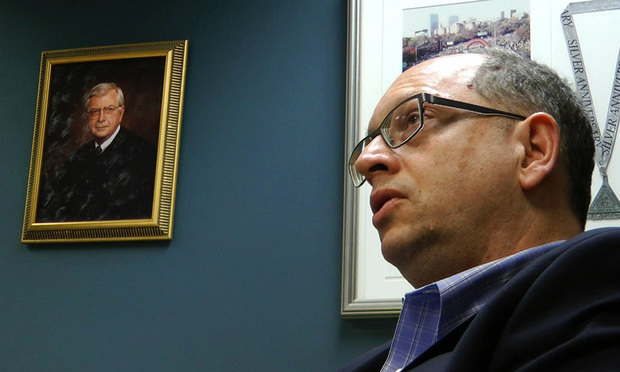Execution Set for Package Bomb Killing of Ala. Judge 28 Years Ago
The bombings created a wave of terror across the South. Now, nearly 30 years later, Alabama is preparing to execute Walter Leroy Moody Jr. of Rex, Georgia, by lethal injection next month.
March 22, 2018 at 11:33 AM
6 minute read

Judge Robert S. Vance was at his kitchen table on Dec. 16, 1989, when he opened a package that had been mailed to his home. The bomb hidden inside exploded with brutal force, killing Vance instantly and severely injuring his wife.
Two days later, a similar device killed an attorney in Georgia. Two other mail bombs were later intercepted and defused, one at a federal courthouse in Atlanta and the other at an NAACP office in Jacksonville, Florida.
The bombings created a wave of terror across the South. Now, nearly 30 years later, Alabama is preparing to execute the man convicted in Vance's killing, Walter Leroy Moody Jr. of Rex, Georgia. Moody is set for lethal injection next month.
The long-delayed resolution to the old crime comes as Texas officials grapple with a deadly spate of bombings over three weeks that ended Wednesday when the suspect blew himself up.
The complex investigation that led to Moody's prosecution is a reflection of how difficult it can be to get to the bottom of sporadic bombings like the ones in Texas. And it is also a testament to the lingering effects that such a crime can have.
Tom Thurman, who retired from the FBI's crime laboratory after handling cases including the Vance assassination, said bombings are “more complicated in many aspects” than other crimes.
“On the investigative side it's so different from other crimes that involve personal contact,” he said. “An individual is there to stab, hit or shoot somebody … and a lot of times law enforcement is fortune to have someone who was there. In most bombing cases, the person who sets the device or sends it is not there. They've got some anonymity.”
Vance's son, Robert Vance Jr., said he is thankful Moody is in prison, and he feels for the victims in Texas, where two people were killed and four were badly injured by package bombs.
“I've been in the place of the families down in the Austin area going through this. It's just so frustrating because you don't know who is responsible or why,” said Vance, now a Democratic state court judge seeking the office of chief justice of the Alabama Supreme Court.
Moody has always maintained his innocence. Agents arrested him in July 1990 after what leaders called one of the largest federal investigations ever.
Robert S. Vance was a member of the Atlanta-based 11th U.S. Circuit Court of Appeals, and prosecutors alleged Moody targeted him out of anger at the 11th Circuit's refusal to overturn a conviction that blocked Moody, who had attended law school, from ever practicing law.
The bomb that killed Robert E. Robinson, a black civil rights attorney from Savannah, Georgia, was meant to cast suspicion on the Ku Klux Klan, as was the bomb sent to the NAACP office, authorities said.
By reconstructing the two bombs that killed Vance and Robinson and disarming the two others, investigators determined they were wrapped in nearly identical packages and mailed using the same kind of stamps. There were also similarities between the materials used in the bombs, including improvised detonators and wiring methods, Thurman said.
It's the same with any bombing case, Thurman said: Investigators have to consider a multitude of factors, starting with the components of the device. In Moody's case, the bomb was manufactured in a way that led back to its maker, he said.
After Vance's death, officials retrieved an intact bomb from the courthouse that housed 11th Circuit judges in Atlanta. Forensic chemist Lloyd Erwin of the U.S. Bureau of Alcohol, Tobacco, Firearms and Explosives recognized a unique element of its construction from a previous case: The ends of the pipe bomb were made of flat, welded pieces of metal rather than the screw caps most commonly used.
That tidbit led investigators to Moody, who had been convicted in a 1972 case involving a bomb with flat, welded end pieces.
Moody's former wife testified that she purchased bomb-making materials at his direction, and evidence linked Moody to a manual typewriter with a misplaced “a” that experts said had been used to write a letter claiming responsibility for the bombs. One letter talked about a “declaration of war” against the judiciary and complained about the 11th Circuit's “callous disregard for justice,” court documents show.
A prosecution team led by Louis Freeh, who later became FBI director, convinced a federal jury that Moody was to blame for the bombing wave, and a judge sentenced him to seven life sentences plus 400 years in August 1991.
Moody was convicted on a state capital murder charge in 1996 in Vance's killing, and he has been on death row since 1997. Now 82, he is the oldest inmate awaiting execution in Alabama.
The Alabama Supreme Court has set Moody's lethal injection for April 19, but Moody has sent a letter to Vance's son and others claiming he is the innocent victim of a government conspiracy. A federal defender has asked a federal court to block the execution, arguing the state can't execute Moody because he's technically in federal custody. A judge has not yet ruled.
Vance said he feels peace “that justice has been done” in his father's case, and he doesn't plan to witness Moody's execution. But every new bombing, like the string of blasts in Texas, dredges up old feelings.
“Usually these days I get up and don't really think about what happened 30 years ago,” Vance said. “But when you see that in the media, you go back to December 1989.”
This content has been archived. It is available through our partners, LexisNexis® and Bloomberg Law.
To view this content, please continue to their sites.
Not a Lexis Subscriber?
Subscribe Now
Not a Bloomberg Law Subscriber?
Subscribe Now
NOT FOR REPRINT
© 2025 ALM Global, LLC, All Rights Reserved. Request academic re-use from www.copyright.com. All other uses, submit a request to [email protected]. For more information visit Asset & Logo Licensing.
You Might Like
View All
Panel to Decide if Governor Should Suspend Georgia Lawyer From Elected Post
4 minute read
Big Tech Is Cozying Up to President Trump. Here's Why Their Lawyers Are Cautiously Optimistic

Trending Stories
- 1In Novel Oil and Gas Feud, 5th Circuit Gives Choice of Arbitration Venue
- 2Jury Seated in Glynn County Trial of Ex-Prosecutor Accused of Shielding Ahmaud Arbery's Killers
- 3Ex-Archegos CFO Gets 8-Year Prison Sentence for Fraud Scheme
- 4Judges Split Over Whether Indigent Prisoners Bringing Suit Must Each Pay Filing Fee
- 5Law Firms Report Wide Growth, Successful Billing Rate Increases and Less Merger Interest
Who Got The Work
J. Brugh Lower of Gibbons has entered an appearance for industrial equipment supplier Devco Corporation in a pending trademark infringement lawsuit. The suit, accusing the defendant of selling knock-off Graco products, was filed Dec. 18 in New Jersey District Court by Rivkin Radler on behalf of Graco Inc. and Graco Minnesota. The case, assigned to U.S. District Judge Zahid N. Quraishi, is 3:24-cv-11294, Graco Inc. et al v. Devco Corporation.
Who Got The Work
Rebecca Maller-Stein and Kent A. Yalowitz of Arnold & Porter Kaye Scholer have entered their appearances for Hanaco Venture Capital and its executives, Lior Prosor and David Frankel, in a pending securities lawsuit. The action, filed on Dec. 24 in New York Southern District Court by Zell, Aron & Co. on behalf of Goldeneye Advisors, accuses the defendants of negligently and fraudulently managing the plaintiff's $1 million investment. The case, assigned to U.S. District Judge Vernon S. Broderick, is 1:24-cv-09918, Goldeneye Advisors, LLC v. Hanaco Venture Capital, Ltd. et al.
Who Got The Work
Attorneys from A&O Shearman has stepped in as defense counsel for Toronto-Dominion Bank and other defendants in a pending securities class action. The suit, filed Dec. 11 in New York Southern District Court by Bleichmar Fonti & Auld, accuses the defendants of concealing the bank's 'pervasive' deficiencies in regards to its compliance with the Bank Secrecy Act and the quality of its anti-money laundering controls. The case, assigned to U.S. District Judge Arun Subramanian, is 1:24-cv-09445, Gonzalez v. The Toronto-Dominion Bank et al.
Who Got The Work
Crown Castle International, a Pennsylvania company providing shared communications infrastructure, has turned to Luke D. Wolf of Gordon Rees Scully Mansukhani to fend off a pending breach-of-contract lawsuit. The court action, filed Nov. 25 in Michigan Eastern District Court by Hooper Hathaway PC on behalf of The Town Residences LLC, accuses Crown Castle of failing to transfer approximately $30,000 in utility payments from T-Mobile in breach of a roof-top lease and assignment agreement. The case, assigned to U.S. District Judge Susan K. Declercq, is 2:24-cv-13131, The Town Residences LLC v. T-Mobile US, Inc. et al.
Who Got The Work
Wilfred P. Coronato and Daniel M. Schwartz of McCarter & English have stepped in as defense counsel to Electrolux Home Products Inc. in a pending product liability lawsuit. The court action, filed Nov. 26 in New York Eastern District Court by Poulos Lopiccolo PC and Nagel Rice LLP on behalf of David Stern, alleges that the defendant's refrigerators’ drawers and shelving repeatedly break and fall apart within months after purchase. The case, assigned to U.S. District Judge Joan M. Azrack, is 2:24-cv-08204, Stern v. Electrolux Home Products, Inc.
Featured Firms
Law Offices of Gary Martin Hays & Associates, P.C.
(470) 294-1674
Law Offices of Mark E. Salomone
(857) 444-6468
Smith & Hassler
(713) 739-1250







